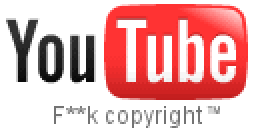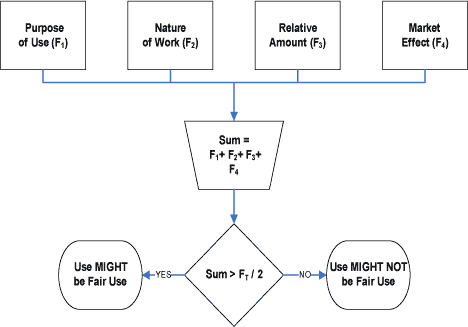I'm a big YouTube fan.
We can thank YouTube for cutting the gordian knot of video codecs. Instead of futzing around with codecs and media players, YouTube's universal, Flash-based web video "just works". After all this time, it turns out the killer app for Flash wasn't advertising or web games. It was video. It's a cross-platform model Microsoft is aping with Silverlight, and for good reason.
YouTube feels like a web institution already, even though the site is less than 2 years old. I love the fact that (almost) any video ephemera I can think of can be found on YouTube, and instantly shared with anyone in the world using nothing more than a web browser and a hyperlink. It's a beautiful thing.
But one thing bugs me about YouTube. On their upload page, you'll find this disclaimer:
Do not upload any TV shows, music videos, music concerts, or commercials without permission unless they consist entirely of content you created yourself. Please refer to our Copyright Tips page for some guidelines and links to help you determine whether your video infringes someone else's copyright.
Take a minute to read YouTube's copyright tips page. I'm serious. Read it. It's full of gems like this:
- It doesn't matter how long or short the clip is, or exactly how it got to YouTube. If you taped it off cable, videotaped your TV screen, or downloaded it from some other website, it is still copyrighted, and requires the copyright owner's permission to distribute.
- It doesn't matter whether or not you give credit to the owner/author/songwriter -- it is still copyrighted.
- It doesn't matter that you are not selling the video for money -- it is still copyrighted.
- It doesn't matter whether or not the video contains a copyright notice -- it is still copyrighted.
- It doesn't matter whether other similar videos appear on our site -- it is still copyrighted.
- It doesn't matter if you created a video made of short clips of copyrighted content -- even though you edited it together, the content is still copyrighted.
Now think back through all the videos you've watched on YouTube. How many of them contained any original content? Let's see. Recently I've linked to the faux Machete trailer from Grindhouse, a classic Kids in the Hall skit (and another one), a surreal computer animated skit called Bingo the Clown-O, and the Writer's Award intro from the 2007 Emmys. Notice anything in common here? That's right. Virtually everything of interest on YouTube is copyrighted content.
It's perhaps the ultimate case of cognitive dissonance: by YouTube's own rules, YouTube cannot exist. And yet it does.

How do we reconcile YouTube's official hard-line position on copyright with the reality that 90% of the content on their site is clearly copyrighted and clearly used without permission? It seems YouTube has an awfully convenient "don't ask, don't tell" policy-- they make no effort to verify that the uploaded content is either original content or fair use. The copyrighted content stays up until the copyright owner complains. Then, and only then, is it removed.
Anytime we become aware that a video or any part of a video on our site infringes the copyrights of a third party, we will take it down from the site. We are required to do so by law. If you believe that a video on the site infringes your copyright, send us a copyright notice and we will take it down.
It's completely glossed over on the YouTube copyright page in favor of 100% original content, but the loophole in copyright is fair use. Under the banner of fair use, you could legally upload a video without the copyright holder's permission. Anyone who contributes anything to the web should have the four factors of fair use commited to memory by now:
- the purpose of the use
- the nature of the copyrighted work
- the relative amount of the portion used
- the market effect of the use on the copyrighted work
These are the four factors courts use to determine if something is fair use. It's worth digging a little deeper to see how these could potentially apply to a typical YouTube video clip.
1. Was it transformative? Uploading a 2 minute clip from Kids in the Hall isn't transformative in the least. Nothing new was added. No context was provided. It's not a parody, it's not research, it's not commentary. It's a small segment of the original content, transplanted to the web. It's only "transformative" in the sense that it's much more readily available to the public.
2. What is the nature of the source material? The majority of clips on YouTube are there to amuse; they draw their source material from works of entertainment. Entertainment is an enjoyable pastime, but it's not a public good. Dissemenation of facts or information benefits the public; video clips of man getting hit in the groin with football.. not so much.
3. How much was taken? YouTube instituted a 10 minute length limit, probably to prevent excessive use claims from taking root. It's a policy that seems to work. Most clips tend to be fairly small, even after factoring in the 10 minute limit.
4. What's the market effect? I find it very difficult to believe that the short, grainy, low-resolution clips on YouTube could have any kind of measurable negative financial effect on content providers. This is one case where YouTube's below-the-bottom-of-the-barrel video quality works in their favor.
The typical YouTube clip does well on the last two factors of the fair use test, but utterly fails the first two. This is not good, because the factors are listed in order of importance; the transformative and nature tests are considered the most significant factors by courts. It is not possible to make a supportable fair use case for most video clips using copyrighted material on YouTube.
I'm not attacking YouTube here. I think having access to all this copyrighted content in bite-size embeddable form is ultimately a net good for both consumers and creators. What I don't understand is why YouTube continues to get away with the big copyright lie they've perpetuated from day one. They pay lip service to copyright, while building their business on an empire of unauthorized, copyrighted content. It's so brazen-- so blatant.
You can argue that copyright law is broken. I won't disagree with you. But I still dislike YouTube's massive hypocrisy in this area, and I wonder why other people and companies don't get the free ride from the hyper-litigious entertainment industry that YouTube seems to enjoy.
